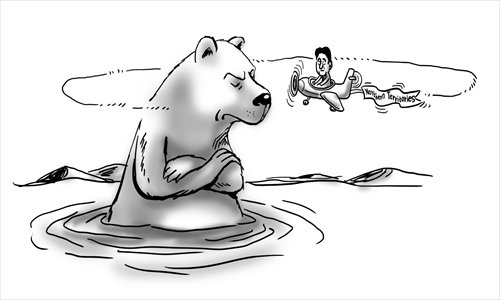Tokyo’s efforts at Moscow outreach stifled

Illustration: Liu Rui/GT
Japanese Prime Minister Shinzo Abe embarked on an extensive trip to Europe in early May, and Russia will be the last leg. Compared with his visit to Germany, France, Italy and the UK, which are all core members in the Western camp like Japan, Abe's trip to Russia has garnered more attention.
Not long after the Ukraine crisis broke out in November 2013, Abe planned to pay a visit to Russia and invite his Russian counterpart Vladimir Putin to visit Japan. But his Russia trip was postponed until now as Japan followed the US and the EU to impose sanctions on Russia.
The visit comes at a time that the frozen relations between Russia and Western countries are thawing a bit after the Russian army supposedly pulled out of Syria. Putin facilitated Western countries' approach to a cease-fire in Syria and suppressed the separatist forces in eastern Ukraine. In late April, tensions between Russia and Western countries showed signs of easing. There is even speculation that the West's sanctions on Russia will be lifted within this year.
Tokyo always looks to Washington as a bellwether in dealing with Moscow and had to impose sanctions on Russia, even though Japanese elites are keen to break the deadlock of territorial disputes with Russia when the latter undergoes economic difficulties. Only when ties between Russia and the West begin to improve, can Abe make the trip to Russia.
Abe's Europe tour is part of Japan's efforts to get a G7 consensus on economic policies. The G7 summit, to be held in Japan later this month, is critical for Japan to expand its clout in the international political circle. It is possible that Abe tried to lobby European countries to get Russia back into the bloc. After all, Russia participated in the G8 summit for years until the Ukraine crisis and returning to the bloc means much to Russia which needs an opportunity to talk with Western countries on an equal footing.
Solving territorial disputes is another agenda during Abe's trip to Russia. The disputes that involve the Kuril Islands, known as the Northern Territories in Japan, between Japan and the Soviet Union, now Russia, have been going on for seven decades. From a legal perspective, WWII has not technically ended between the two since a peace deal has not been signed due to the territorial disputes. Each administration of Japan hopes to make a breakthrough in its term regarding the issue.
And any breakthrough can only be achieved when Putin is president. He is a realist and clearly knows what Russia needs. He also has the resolution to do what others dare not.
Abe may feel an urgent need to reach breakthroughs in the disputes. Japan's upper house will hold elections in July, and any progress in this regard can win support for his Liberal Democratic Party.
For Russia, an improved relationship with Japan can ease its isolation on the world stage and also send a signal to other European nations to lessen their sanctions on Russia. Besides, Japan's capital and technology will benefit the development of Russia's Far East. Normalizing ties with Japan will enable Russia to cope with Asia Pacific affairs more flexibly.
However, the territorial disputes cannot be solved via just a meeting between the two leaders. Even if Putin wants to make a concession, he has to consider whether it will weaken the support for him and his United Russia Party.
Since the Ukraine crisis, Russia's nationalistic sentiments have been rising, which will constrain the government's foreign policies.
The State Duma will hold elections this year, in which the situation is not that favorable to the ruling party. Amid a gloomy economy, all political factions in Russia have resorted to nationalism. Too many concessions by the Russian government will make its ruling party a target of public criticism.
There is a slim possibility for Russia and Japan to make real progress in their territorial disputes, but they can at least advance the development of the disputed islands and the Far East. Russia may relax restrictions on Japan to land on the islands.
The author is a PhD candidate at the Center for Russian Studies, East China Normal University. opinion@globaltimes.com.cn Follow us on Twitter @GTopinion